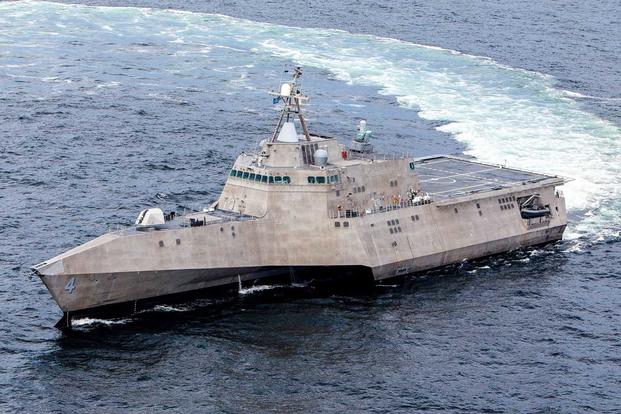An order from the Pentagon chief has crunched the Navy's timeline to pick one of two littoral combat ship/frigate variants, and officials with Naval Sea Systems Command say they're making adjustments to avoid incurring extra costs as a result.
Capt Dan Brintzinghoffer, the program manager for the Navy's future frigate, on Wednesday told an audience at the Sea Air Space expo near Washington, D.C., that the Navy was officially planning to select a frigate variant in fiscal 2018, choosing between contractors Austal and Lockheed Martin to furnish the ships.
While Defense Secretary Ash Carter directed the service to make the choice no later than fiscal 2019, current planning calls for the purchase of just one frigate in fiscal 2018, rather than two as in previous years. If a decision isn't made before then, one company would get an unfair competitive advantage, Brintzinghoffer said.
"We're kind of rolling with the punches on the way the budget flows and the direction that we receive," he said. "We're going to be working towards a FY18 downselect towards a frigate design, and the frigate design is going to be based on the competition."
In order to keep the tight deadline from boosting costs, Brintzinghoffer said the government is backing off both companies somewhat, allowing them more freedom to design elements of their frigate variants the way they deem most effective.
"In the original plans going forward, the government was being a lot more prescriptive with how we were going to make changes," he said. "We needed to give them back some of that trade space. So we became less prescriptive."
Brintzinghoffer declined to name specific examples of loosened guidelines, saying they differed between the two variants. "Each one has some very unique capabilities and changes it would bring," he said.
The tight timeline will also require communication with the builders to ensure that the frigate designs they submit for consideration are mature enough to provide realistic cost estimates for the building process. Each variant proposal, he said, had different "design maturity risk areas" that could prove challenging in the contracting process.
"If there's not a clear level of understanding and maturity in the design, what the government will force industry to do is to bid higher prices in the proposal," he said. "And that's certainly not what we want to do."
The frigate variant of the Littoral Combat Ship is designed to be more lethal and more survivable than the original version of the ship. Regardless of the variant selected, the frigate will also require more sailors to operate -- about 120 compared to the current crew size of 90 -- and include more troops in electronic warfare specialties.
The frigate will be armed and equipped for anti-submarine as well as surface warfare, and come with additional missiles, including a yet-to-be-selected over-the-horizon missile system.
The Navy is also planning to retrofit the fleet's existing LCS vessels with survivability upgrades that will give them parity with the future frigates, though some differences may persist. The new missile system may have to be placed in a different location on the ship than it is on the frigate because of space constraints on the existing ships, Brintzinghoffer said. And the older ships may not ultimately be able to carry as many missiles as the new.
The possibility remains, he said, that current LCS ships may be renamed frigates after they receive their survivability upgrades. But they will be evaluated on total capability, rather than on a particular weapons system.
"One of the biggest and most substantial changes will make it multi-mission ship," he said. "So just adding an over-the-horizon missile may or may not just trip a wire and make it a frigate."
Even after the new upgrades are in place and the new frigates roll out, it's unlikely the controversy following the costly LCS program will disappear.
A draft Government Accountability Office study obtained by Bloomberg News reportedly finds the new frigate "will not result in significant improvements in survivability." The study also reportedly recommends that Congress consider not funding any littoral combat ships in fiscal 2017.
--Hope Hodge Seck can be reached at hope.seck@military.com. Follow her on Twitter at @HopeSeck.

























